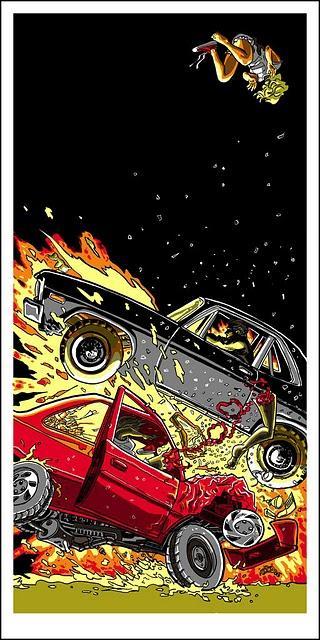"Death Proof is not my favorite of Tarantino’s films, but having seen my share (and your share, and probably the next 10 people’s share) of Grindhouse films, I knew what he was shooting for, and I appreciate the intent, at least. HOWEVER- the film has one hum-dinger of a car accident. It’s really a masterstroke of practical effects and sheer violence. Obviously in the film there’s the undercurrent of Stuntman Mike’s car-crash proclivities being a metaphorical (and possibly actual) sexual release, but I also think there’s another level in that these big old American cars can really wreck house on the smaller, crappier modern cars. Mike’s Nova totally disassembles the Civic in the first half, and it isn’t until the girls in the second half get their hands on a Challenger are they a match for Mike. In fact- in the big car chase at the end, all the modern plastic vehicles are merely obstacles to be overcome in this epic muscle-car duel. (Please note, I drive a 2007 Prius…sigh.)" - Tim Doyle
 A 1971 Chevy Nova Making Love to a 1996 Honda Civic (Doyle, 2011)Mi gestión es este blog es considerablemente ingenua (naive). Si cumple con el fin de satisfacer una necesidad, la de pensar. Se espera un intercambio de ideas, a la luz de temas discutidos en las artes literarias, filosofía, actualidad, ciencias, etc.
A 1971 Chevy Nova Making Love to a 1996 Honda Civic (Doyle, 2011)Mi gestión es este blog es considerablemente ingenua (naive). Si cumple con el fin de satisfacer una necesidad, la de pensar. Se espera un intercambio de ideas, a la luz de temas discutidos en las artes literarias, filosofía, actualidad, ciencias, etc.

